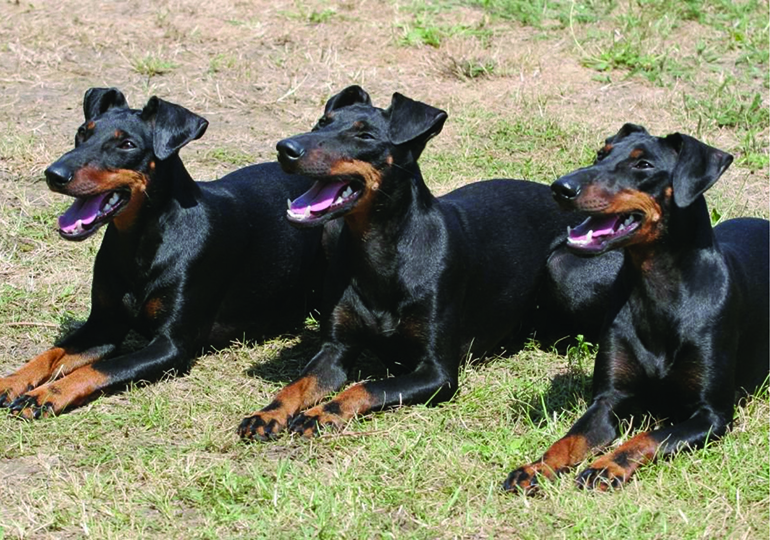Breeds
Manchester Terrier

GROUP 2 - TERRIERS
History
People who own a Manchester Terrier may be asked if it’s a Miniature Dobermann. It’s an easy mistake to make at first glance, as this unusual little Terrier does somewhat resemble the Dobermann breed, but that’s where the similarities end.
Manchester Terriers are said to be the descendants of the old English Black-and-Tan Terrier. Unlike most Terrier breeds, the Manchester is a city dog. Shipping docks around Liverpool and Manchester were alive with rats due to poor sanitation in the 1800s, so there was plenty of work for this quick-witted and nimble Terrier.
When the Kennel Club opened its stud books in 1873, the Manchester Terrier was still known as the English Black-and-Tan Terrier. At the time, the distinguished dog judge and writer Hugh Dalziel described the Manchester as the most elegant and graceful of all Terriers.
Characteristics & Appearance
Manchester Terriers are eye-catching little dogs. The head is long and wedge-shaped with bright, almond-shaped eyes and small v-shaped ears set high. The short body has a straight to slightly roach back and a whiptail.
Legs are in proportion to the dog, neither too short nor too long. Colour is jet black with rich mahogany-tan markings. The coat is smooth and glossy with a firm texture.
The Manchester Terrier is strongly people oriented and makes a wonderful family companion.
Vital Statistics
General appearance: compact, elegant and sound with substance.
Characteristics: keen, alert, gay and sporting.
Temperament: discerning and devoted.
Eyes: relatively small, dark and sparkling. Almond-shaped, not prominent.
Body: short with well-sprung ribs, slightly arched over the loin and cut up behind ribs.
Feet: small, semi-harefooted and strong with well-arched toes.
Tail: short and set on where arch of back ends, thick where it joins body, tapering to a
point, carried not higher than level of back.
Gait/movement: straight, free and balanced with good reaching forequarters.
Coat: close, smooth, short and glossy, of firm texture. (1)
Temperament
High-spirited, agile and intelligent, the Manchester Terrier is an affectionate dog that makes a wonderful companion. It is devoted and faithful; extremely lively, alert, keen and vigilant.
The Manchester Terrier is eager to please and excels in both Agility and Obedience. Being of athletic build, the breed is very active and benefits from daily exercise. However, given the choice, the Manchester Terrier prefers the company of people to a long walk. At first, a Manchester Terrier can be a little reserved; it is not everyone’s immediate friend. Therefore, early and positive socialisation is essential for a young Manchester Terrier.
Maintenance & Suitability
The breed’s smooth coat and devotion to family make it an ideal house and watchdog. Being a sociable animal, the Manchester Terrier is not suited to a solitary life in the backyard.
Its short coat does shed, but is easily maintained with a quick brush and occasional wash as required. During winter, the breed would benefit from a dog coat at night or on very cold days.
The Manchester Terrier is a suitable pet for a wide range of situations, from families with children to active older people. A true Terrier, the breed is intelligent and affectionate with people.
The Manchester Terrier is low maintenance, sound in health and loyal at heart. It has an affectionate nature and would be an excellent choice for an urban or country household. Manchester Terriers are not entirely reliable around small, non-canine animals, as its hunting instincts are strong.
The breed should be socialised as a puppy and introduced to children as early as possible. If its needs as a canine are met, the Manchester Terrier will make a wonderful family companion.
Health
It’s reasonable to claim that anyone purchasing a Manchester Terrier will most likely enjoy an average of 14 trouble-free years with their pet. This is not to say that health problems are completely unknown in this breed.
Von Willebrand’s disease (vWD), a bleeding disorder common in a number of breeds, has been known to affect the Manchester Terrier, although it is rare in Australia. The disease is an inherited deficiency of one of the 13 clotting factors of the blood, similar to haemophilia. A genetic marker has been identified for vWD in Manchester Terriers, allowing breeders to ensure no affected dogs are produced.
A common and serious genetic problem in purebred dogs, hypothyroidism has been seen in both Toy and Standard Manchester Terriers (as well as most other breeds of dogs) outside of Australia.
The disease results from the impaired production and secretion of thyroid hormone, which is responsible for a number of important functions including regulating metabolism.
Hypothyroidism causes a wide variety of symptoms, but is often suspected in dogs that have trouble with weight gain or obesity, hair loss, skin problems or temperament changes. Hypothyroidism is easy to diagnose with a blood test and can often be regulated with synthetic thyroid medication.
Overall, the Manchester Terrier is a sound breed and has an average life span of 14 years.
Words: Diane Hull
1. Source: DOGSAUSTRALIA.org.au
Image: pet4homes
In Conclusion
Now you know a little about the Manchester Terrier, you may think that this is the dog for you. Before you make a decision, please make contact with the breed club or your State controlling body for purebred dogs. They will be able to give you information about available puppies and also suggest dog shows where you can see the breed and speak to breeders. In this way you will gain a better perspective of the Manchester Terrier and its needs, and whether this breed would suit your lifestyle.


